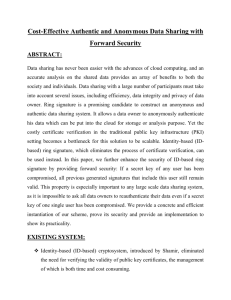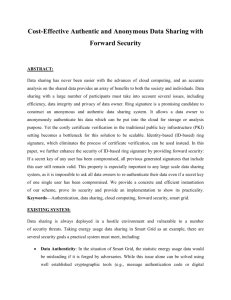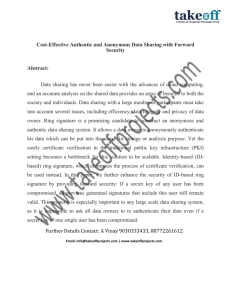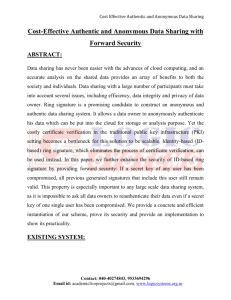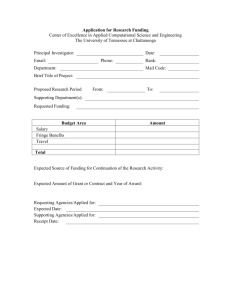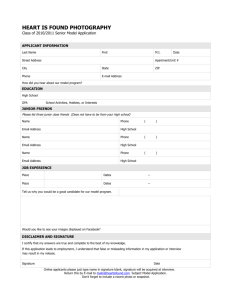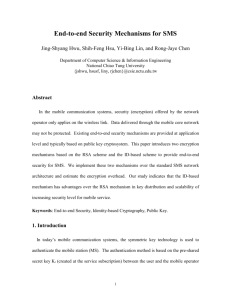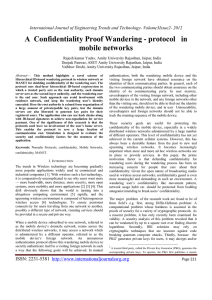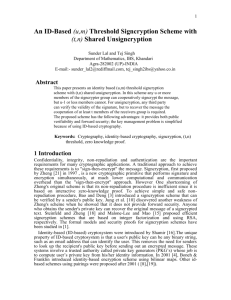- Krest Technology
advertisement
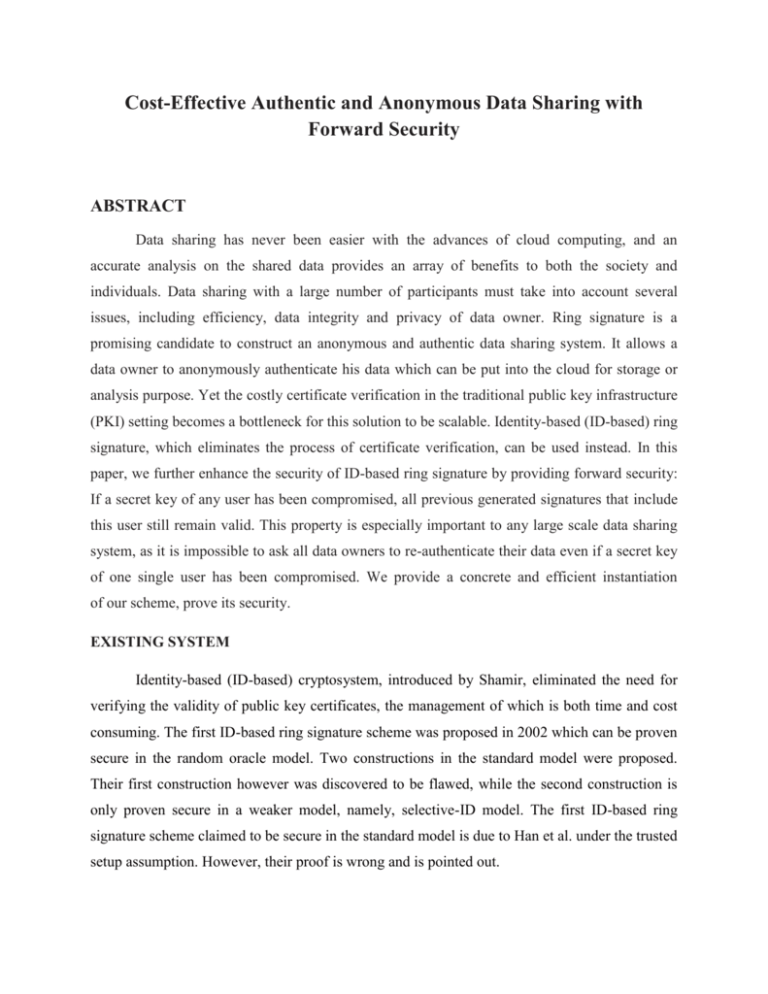
Cost-Effective Authentic and Anonymous Data Sharing with Forward Security ABSTRACT Data sharing has never been easier with the advances of cloud computing, and an accurate analysis on the shared data provides an array of benefits to both the society and individuals. Data sharing with a large number of participants must take into account several issues, including efficiency, data integrity and privacy of data owner. Ring signature is a promising candidate to construct an anonymous and authentic data sharing system. It allows a data owner to anonymously authenticate his data which can be put into the cloud for storage or analysis purpose. Yet the costly certificate verification in the traditional public key infrastructure (PKI) setting becomes a bottleneck for this solution to be scalable. Identity-based (ID-based) ring signature, which eliminates the process of certificate verification, can be used instead. In this paper, we further enhance the security of ID-based ring signature by providing forward security: If a secret key of any user has been compromised, all previous generated signatures that include this user still remain valid. This property is especially important to any large scale data sharing system, as it is impossible to ask all data owners to re-authenticate their data even if a secret key of one single user has been compromised. We provide a concrete and efficient instantiation of our scheme, prove its security. EXISTING SYSTEM Identity-based (ID-based) cryptosystem, introduced by Shamir, eliminated the need for verifying the validity of public key certificates, the management of which is both time and cost consuming. The first ID-based ring signature scheme was proposed in 2002 which can be proven secure in the random oracle model. Two constructions in the standard model were proposed. Their first construction however was discovered to be flawed, while the second construction is only proven secure in a weaker model, namely, selective-ID model. The first ID-based ring signature scheme claimed to be secure in the standard model is due to Han et al. under the trusted setup assumption. However, their proof is wrong and is pointed out. Disadvantages of Existing System: 1. Data Authenticity: In the situation of smart grid, the statistic energy usage data would be misleading if it is forged by adversaries. While this issue alone can be solved using well established cryptographic tools (e.g., message authentication code or digital signatures), one may encounter additional difficulties when other issues are taken into account, such as anonymity and efficiency; 2. Anonymity: Energy usage data contains vast information of consumers, from which one can extract the number of persons in the home, the types of electric utilities used in a specific time period, etc. Thus, it is critical to protect the anonymity of consumers in such applications, and any failures to do so may lead to the reluctance from the consumers to share data with others. 3. Efficiency: The number of users in a data sharing system could be HUGE (imagine a smart grid with a country size), and a practical system must reduce the computation and communication cost as much as possible. Otherwise it would lead to a waste of energy, which contradicts the goal of smart grid. PROPOSED SYSTEM In this paper, we propose a new notion called forward secure ID-based ring signature, which is an essential tool for building cost-effective authentic and anonymous data sharing system: For the first time, we provide formal definitions on forward secure ID-based ring signatures; We present a concrete design of forward secure ID-based ring signature. No previous ID-based ring signature schemes in the literature have the property of forward security, and we are the first to provide this feature; we prove the security of the proposed scheme in the random oracle model, under the standard RSA assumption. Advantages of Proposed System: 1. It is in ID-based setting. The elimination of the costly certificate verification process makes it scalable and especially suitable for big data analytic environment. 2. The size of a secret key is just one integer. 3. Key update process only requires an exponentiation. 4. We do not require any pairing in any stage. MODULES 1. Authentication Module 2. Identity based Ring Signature Module 3. Forward Security Module Module Description: Authentication: Authentication often involves verifying the validity of at least one form of identification. Identity based Ring Signature: This module can be proven secure in the random oracle model. Two constructions in the standard model were proposed. The First construction however was discovered to be flawed, while the second construction is only proven secure in a weaker model, namely, selectiveID model. This module eliminates the process of certificate verification, can be used instead. Forward Security: Forward Security protects past sessions against future compromises of secret keys or passwords. If forward secrecy is utilized, encrypted communications recorded in the past cannot be retrieved and decrypted should long-term secret keys or passwords be compromised in the future. SYSTEM CONFIGURATION Hardware Configuration Processor - Pentium –IV Speed - 1.1 Ghz RAM - 256 MB(min) Hard Disk - 20 GB Key Board - Standard Windows Keyboard Mouse - Two or Three Button Mouse Monitor - SVGA Software Configuration Operating System : Windows XP Programming Language : JAVA Java Version : JDK 1.6 & above.
